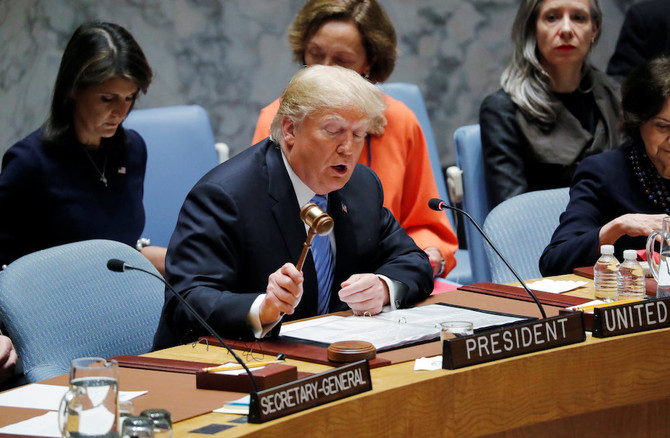NEW YORK: Donald Trump on Wednesday warned against Iran's pursuit of a nuclear weapon. as he chaired a United Nations Security Council meeting for the first time.
A government with Iran's track record "must never be allowed to obtain" a nuclear weapon, the US president said as he addressed the meeting in New York.
Trump said Iran had stepped up its "aggression" after signing a nuclear accord in 2015, saying Tehran took advantage of a lifting of sanctions to fund a missile program.
"In the years since the deal was signed, Iran's aggression only increased," Trump said. "The regime used new funds from the deal to support terrorism, build nuclear capable missiles and foment chaos."
The meeting piled more pressure on Tehran, a day after the US president used his UN General Assembly speech to accuse Iran of sowing "chaos, death and destruction.”
Washington has moved to isolate Iran after pulling out of the 2015 deal to curb Tehran’s nuclear program in exchange for a reduction in crippling international sanctions against the country.
Trump also accused Iran, along with Russia, of enabling President Bashar Al-Assad to carry out his "butchery" in Syria.
The meeting was attended by many heads of state in New York for the UN General Assembly, including European leaders trying to keep the Iran nuclear deal alive after Trump announced America's withdrawal earlier this year.
Both Theresa May and Emmanuel Macron said they were committed to the deal but said there were deep concerns about Iran's ballistic missile program and exporting of that technology to its proxies in Lebanon and Yemen.
"In the Middle East, the ballistic assistance provided to (Lebanon's) Hezbollah and (Yemen's) Houthis is a new and alarming development and has to stop before it further destabilises a tense region," Macron said.
He said a policy of sanctions and containment on Iran was not enough and that a long-term plan to manage the crisis should be put together.
The United States had initially said the Security Council meeting chaired by Trump would focus on Iran, but later broadened the agenda under the theme of nuclear non-proliferation and weapons of mass destruction.
The US this month holds the presidency of the 15-nation council that deals with the world's most pressing security threats.
During his opening statement Trump accused China of working against his Republican Party in upcoming elections, saying Beijing did "not want me or us to win" because of his hard line on trade.


























